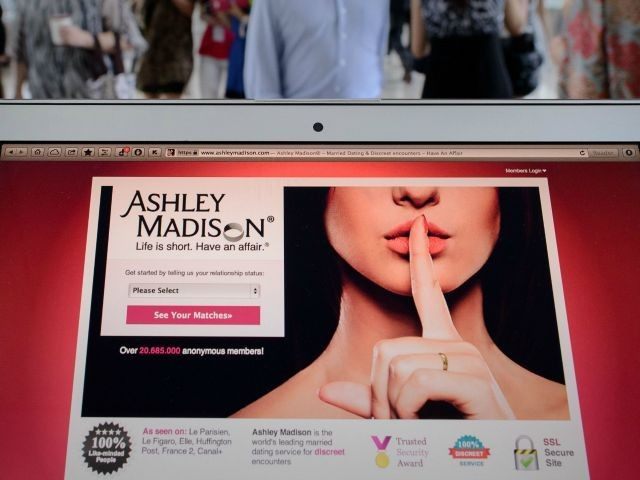These are tense times at the offices of the AshleyMadison website, which caters to people who want to date around despite being married, but apparently aren’t “progressive” enough to brag about it, judging by the panic that ensued after hackers stole confidential client information and threatened to make it public.
Also, there’s a website looking to pick up what might be called the aftermarket business from cheater websites: FidelityDating.com, which is pitching itself to what the New York Post describes as “‘infidelity survivors’ seeking other singles who’ve also been through cheating scandals.”
It’s not necessarily a narrow appeal, exclusively tailored for those infidelity survivors. The site’s slogan, “Love is precious. Stay faithful,” is equally valuable for the never-married, while the signature element of signing up for FidelityDating is a simple “contract” affirming that the user is “not in a relationship” and will be “honest and faithful.”
This is not greatly dissimilar to the commitment many other dating sites ask for, but FidelityDating was founded by people who had experienced infidelity in their lives, and place great emphasis upon honesty and loyalty. Partner Julie Surrey tells an uncomfortable story about accidentally discovering a marriage license to a different woman on her live-in boyfriend’s computer, and says she wants to spare other men and women from such heartache. The New York Post describes her as “busy weeding out scammers with fake profiles and serving as informal agony aunt to needy members who’ve been betrayed.”
“Our members are looking for loyal people they can trust,” said co-founder Gary Spivak. “Because they’ve been through infidelity themselves, they know why it’s important not to hide things in a relationship.” He went on to advocate a level of openness that included partners feeling free to read each others’ email.
The FidelityDating site is currently free during its launch phase, but will eventually charge for memberships. They service both gay and straight couples, young and old, with Surrey observing that “the majority of our members have some life experience behind them.” Their client mix is currently estimated at 60 percent women, 40 percent men.
Computers and the Internet figure prominently in many of the member infidelity stories related by the Post, which could mean either that social media is making it easier for cheaters to find partners, or easier for them to get caught (or most likely both.) The rise of dating sites dedicated to people with traditional romantic values and old-fashioned expectations also testifies to the Internet’s value as a marketplace of ideas… as does the existence of swinger sites and adultery hookup centers like AshleyMadison, whose proprietors often speak as if they were scientists conducting an elaborate sociological experiment.
Are we so far removed from a time when the tenets of an operation like FidelityDating were considered common sense, at least as ideal? Much of our ongoing social degeneration involves treating ideals as unrealistic fantasies, hypocrisies, religious dogma, or thought-control weapons of the evil patriarchy, and tearing them down to meet a lowest-common-denominator notion of human nature. Aiming high and expecting much from one another is treated as unrealistic, and doomed to end in crushing disappointment.
There seems to be mounting resistance to this hollow view of love and sex, although perhaps not yet so vigorous as what Samantha Allen perceives in a Monday Daily Beast article called “When Did the Internet Turn Into the Morality Police?” Some of the examples she sites, such as the Gawker website’s penchant for embarrassing public figures, are more about salacious entertainment than moral judgment. (Also, a salient point about the Gawker mess is that many of their embarrassing articles are works of fiction.)
She also mentions the AshleyMadison hacking story, but those hackers appear to be primarily angry with the website charging $19 for a “full delete” service that didn’t actually delete client information fully, not the clients doing business with a web site for cheaters in the first place. The hackers did make a reference to “cheating dirtbag” clients in their manifesto, but they don’t portray themselves as agents of moral judgment smiting a playground of dastardly behavior. (Allen contributes the sad-funny detail that AshleyMadison has a fairly conventional “forgot my password” feature for users, which serves as a convenient way for suspicious spouses to learn if their partners have accounts with the site.)
“Revenge porn,” the distribution of embarrassing material online to shame an unfaithful partner, is at least as much about anger and revenge as moral judgment, and the people viewing the revenge porn are generally motivated by something other than the impulse to chastise immoral behavior. The private lives of Hollywood stars are likewise not generally exposed and bandied about by forces that could be described as “morality police.” Internet “shaming” in general seems more like an act of malice or mischief than censure.
If one seeks solid, lasting evidence of moral judgment growing stronger online, it would be better to search in the quieter precincts of websites catering to people who constructively seek better relationships and more faithful partners. Fidelity is an indispensable building block of society, not a novelty product. It’s heartening to see people seriously using the power of the Internet to find it… and sad that such powerful instruments are needed for the search.

COMMENTS
Please let us know if you're having issues with commenting.